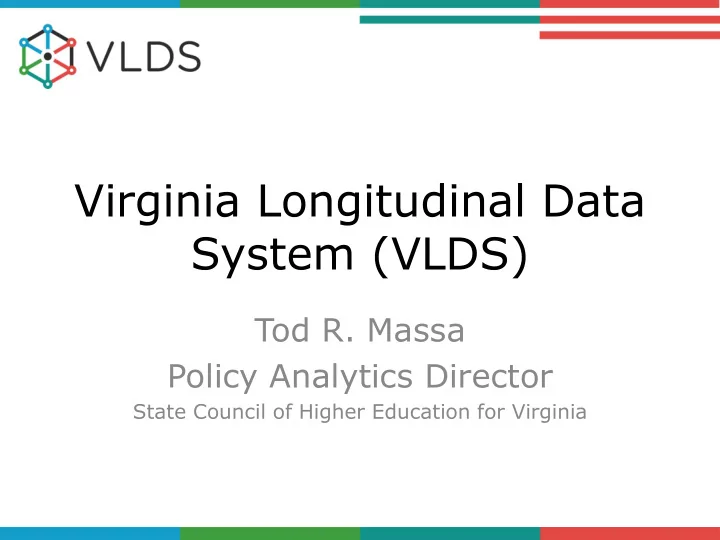

Virginia Longitudinal Data System (VLDS) Tod R. Massa Policy Analytics Director State Council of Higher Education for Virginia
What is VLDS? The Virginia Longitudinal Data System (VLDS) is a collaboration of executive branch agencies and non- governmental organizations to share de-identified student- and citizen- level data
Our Focus • Supporting policy-relevant research, analysis, and reporting that is performed “on our behalf and under our control*.” * If a project does not fit under our Burning Questions and/or the researcher does not agree to those seven words, we simply say “no.”
VLDS is a … • Partnership • Technology Platform • Lifestyle • Brand Sharing data and actively allowing researchers to study interactions and data matches that you have never seen can be scary. You can end up with a research report that is published with findings your stakeholders may not wish to be public knowledge. Participation involves active engagement with your own agency leaders and involvement with researchers, as appropriate, to be aware of their work and to help them avoid mistakes.
Partnership for Improvement A federated data system of equal partners sharing de-identified administrative data, expertise, and purpose to improve citizen lives through enhanced policy recommendations. Department of Education Adult Education Community College System – Workforce Employment Commission Department of Aging and Rehabilitative Services Department for Blind and Vision Impaired Department of Social Services Office of Children’s Services Department of Health Professions State Council of Higher Education Department of Juvenile Justice Virginia Goodwill Network Early Childhood Foundation
Technology Platform • Agency owned & hosted exposure databases (MS SQL & Oracle) allowing a nuclear option • Common structure to identity records • Semi-annual match events • Workflows & communications management through MS Dynamics • Researcher portal with 12-step process
Lifestyle • Monthly DG meetings, supported by monthly/as needed subcommittee meetings • Book of Data Governance – Our bylaws and rules of engagement, governs what we do • All decisions must be unanimous to a standard of “can I (my agency) live with this ?” • Sharing is Scary • What’s in it for me (and my agency)?
Brand
Burning Questions Impact of health, social service, education, and workforce pipeline • on Virginia’s economy; Return on investment of health, social service, education, and • workforce opportunities and programs; Alignment of health, social service, education and workforce • programs to known and projected employers’ needs; Collective, long-term impact of health, social service, education, • and workforce programs on people served; Pathways to the workforce, patterns of employment, and factors • or conditions that predict success; and Factors or conditions that have the greatest impact on educational • achievement and later productivity. More at: http://vlds.virginia.gov/insights/agency-research-agendas/ •
Executive Leadership • Administration is a duty of the State Council – Administer the Virginia Longitudinal Data System as a multiagency partnership for the purposes of developing educational, health, social service, and employment outcome data; improving the efficacy of state services; and aiding decision making. • DG Council is the primary leadership body.
SCHEV’s Role • SCHEV staff manage the vendor relationship and daily activities. – Also acts as the key point of contact for potential researchers and others. • Hosts & leads the DG meetings • Manages the VLDS Twitter account and blog (currently dormant) • Coordinates special projects, such as one funded by DARPA and another with US Census
Policy Environment • A mix of agencies under different secretariats • Children’s Cabinet is advisory, exists by EO, no P-20 Council • DOE is a constitutional agency & board • Most agency heads are appointed by the governor, except SCHEV, VRS, and the institutions
Alignment with Goals & Priorities of Others 1. Partner agendas 2. Funded projects 3. Everything else
Projects • Must be responsive to the Burning Questions • Must advance the policy objectives of the sponsoring agency • Must demonstrate a *need* for person- level data • “interesting to do” is not a justification
Researchers • Must be affiliated with an institution • PhD candidates are generally not considered to be the primary investigator • Must not be on our blacklist for violating privacy or procedure • Must have a demonstrable track record of research
How does this work? • Iteratively – Connections – Questions • Sponsorship • Contract • Twelve Steps • Communication • Review
Flow Data resides at each Agency or in a Data Vault/Pond Agencies manage control using workflow software Researchers access the system via Researcher Portal
Researcher Portal • Team member management • Research information management (Who, What, Where, When, Why) • Data dictionary & selection tool • Data request and retrieval • Document management (NDAs, research papers, etc.) • Ability to check status , modify or cancel account and/or data request • Help / Training • Password reset
The 12 Steps of VLDS
What holds all this together? • Trust – VLDS is all about the relationships. Each one of the partners is there because of a need to access the data of one or more other partners. It takes trust and dealing fairly with each other to make this work. No secrets. No backroom deals.
What we might have done differently • Initial focus was on supporting research, not reporting • Relied less on a consultant model of design • Greater commitment to a broad membership
Friction • Inadequate funding • Busy, busy people • DG members represent different levels of decision-making within agencies • Lack of analytics expertise within many agencies • Sometimes things move more slowly than desired • Expectations are often unreasonable
The Challenge “If you aren’t making mistakes, it is probably because you aren’t doing anything.” • Getting state employees to embrace this mantra is hard. • This especially applies to social media. • You have to create a safe environment for experimentation and evolution.
Contact • todmassa@schev.edu • @SCHEVResearch • @VLDSInsights • @todmassa vlds.virginia.gov research.schev.edu
Recommend
More recommend